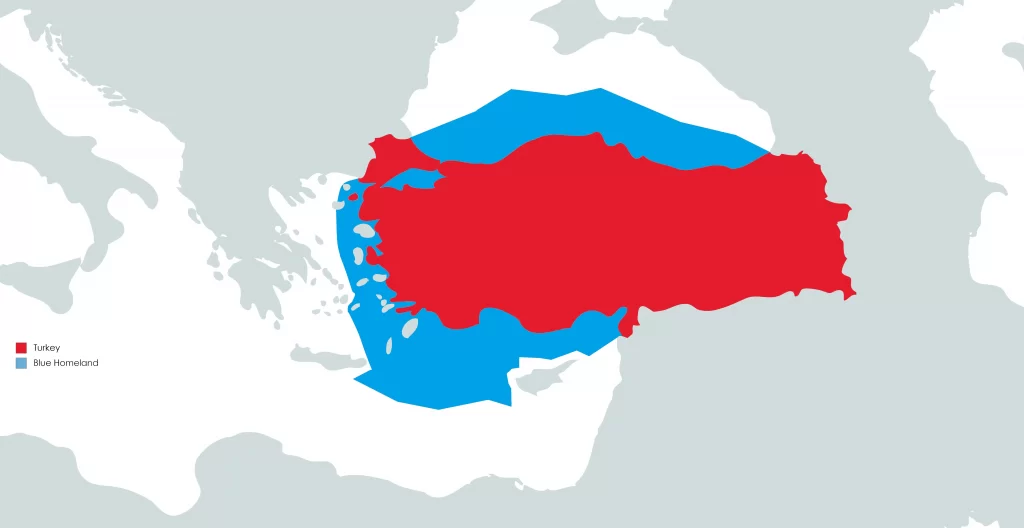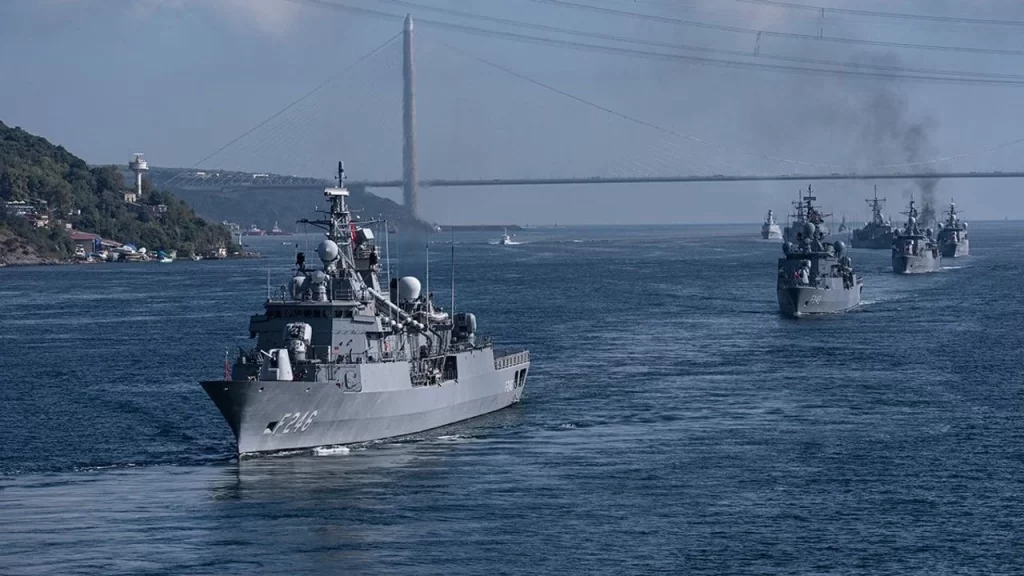The Blue Homeland Doctrine: Turkey’s Naval Strategy for the Eastern Mediterranean
Turkey’s naval strategy in the Eastern Mediterranean has gained significant attention, especially with the emergence of the “Blue Homeland Doctrine” (Mavi Vatan). As geopolitical dynamics evolve, the doctrine has positioned Turkey as a formidable maritime power, safeguarding its interests in this strategically important region. This article explores how the Blue Homeland Doctrine is shaping Turkey’s naval power and protecting its maritime interests in the Eastern Mediterranean.

The Importance of the Eastern Mediterranean
The Eastern Mediterranean is one of the world’s most geopolitically complex regions, with significant natural resources, including untapped hydrocarbon reserves. It serves as a key route for global trade and energy transportation, further increasing its strategic importance. As several regional players, such as Greece, Egypt, and Israel, vie for influence, Turkey’s proactive stance is essential in protecting its rights and ensuring stability in the region.
What is the Blue Homeland Doctrine?
The Blue Homeland Doctrine, conceived by Admiral Cem Gürdeniz, defines Turkey’s maritime jurisdiction and strategic vision for protecting its sovereign rights in its surrounding seas. The doctrine covers the Black Sea, the Aegean Sea, and the Eastern Mediterranean, with the latter being of primary concern due to its abundance of energy resources and overlapping maritime claims with neighboring countries.
The Blue Homeland seeks to expand Turkey’s maritime borders to include continental shelves and exclusive economic zones (EEZs), ensuring access to vital resources. By asserting its rights in these areas, Turkey strengthens its sovereignty over energy exploration and secures critical maritime routes.

Enhancing Naval Power: Turkey’s Maritime Build-Up
Under the Blue Homeland Doctrine, Turkey has made significant strides in modernizing and expanding its naval forces. The Turkish Navy has become a central pillar of this strategy, reflecting the doctrine’s ambition to project power and influence across the region. Key developments include:
- Increased Naval Presence: Turkey has expanded its naval operations across the Eastern Mediterranean, conducting drills and patrols to assert its presence. This has acted as a deterrent to other regional actors while reinforcing Turkey’s stance on maritime claims.
- Indigenous Naval Technologies: Turkey has invested heavily in building indigenous naval capabilities, including the construction of submarines, frigates, and unmanned marine systems. These advancements have bolstered its self-sufficiency and ability to defend its maritime interests.
- Strategic Alliances: While the Blue Homeland Doctrine emphasizes a unilateral approach to protecting Turkish interests, Ankara has also pursued strategic partnerships, such as maritime cooperation with Libya. This agreement extended Turkey’s maritime jurisdiction, further solidifying its influence in the Eastern Mediterranean.
Protecting Maritime Interests: Energy Security and Geopolitical Tensions
A key aspect of the Blue Homeland Doctrine is energy security. The discovery of natural gas reserves in the Eastern Mediterranean has intensified competition among regional powers, leading to conflicting claims over maritime zones. Turkey has firmly stated that it will not allow any unilateral actions that exclude it from energy exploration activities.
Turkey’s maritime claims, backed by the Blue Homeland Doctrine, have also led to heightened tensions with Greece and Cyprus, who dispute Turkey’s drilling activities near their coastlines. However, Ankara maintains that its actions are in accordance with international law, emphasizing the protection of its continental shelf and its rights to exploit regional resources.

Navigating Diplomatic Waters
While Turkey continues to assert its claims militarily and through naval operations, it has also engaged in diplomatic efforts to ease tensions and negotiate maritime boundaries. The establishment of maritime dialogue channels with neighboring countries, as well as Turkey’s advocacy for equitable resource-sharing agreements, illustrates its dual approach of using both diplomacy and naval power.
In this regard, Turkey’s role in the Eastern Mediterranean extends beyond mere resource competition. It is also working towards regional stability, highlighting the importance of a balanced and fair solution to maritime disputes.

The Long-Term Impact of the Blue Homeland Doctrine
The Blue Homeland Doctrine represents a major shift in Turkey’s naval strategy, transforming it into a significant maritime power in the Eastern Mediterranean. Through a combination of military strength, diplomatic engagement, and technological advancements, Turkey is safeguarding its maritime interests while positioning itself as a key player in the region’s geopolitical landscape.
As the competition for maritime resources and influence continues, Turkey’s strategic vision under the Blue Homeland Doctrine will remain central to its defense and foreign policy. The doctrine not only protects Turkey’s rights but also promotes regional security, ensuring that the Eastern Mediterranean remains a stable and accessible zone for global trade and energy exploration.
Related Topic: Turkey’s Eastern Mediterranean Strategy













